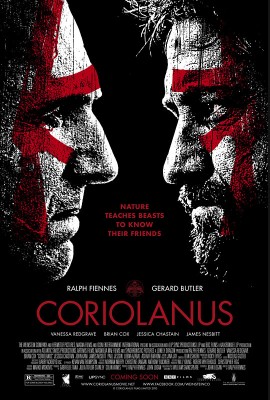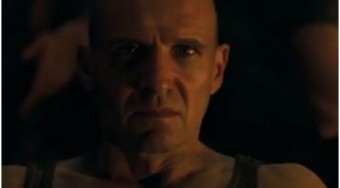Film Reviews

Coriolanus
Genre: Drama, Foreign
Director: Ralph Fiennes
Cast: Ralph Fiennes, Gerard Butler, Brian Cox, Vanessa Redgrave, Jessica Chastain
MPAA-Rating: Rated R for some bloody violence
Release Date: January 13th, 2012
It’s difficult not to appreciate the contemporary significance of the new film Coriolanus.
The story follows a brilliant military leader who — upon returning to Rome after a valiant fight — is cast out of the city. Perhaps the title character doesn’t have the personality of a politician. But he has the integrity of a hero, more about
and that should count for something. Shouldn’t it?
As the story begins, Coriolanus (Ralph Fiennes) is a hero to the people of Rome with enough scars on his body to show his willingness to fight for his country. He’s a stoic military man, but he doesn’t feel the need to prove his allegiances to the general public.
After his military service, his mother Volumnia (Vanessa Redgrave) urges him to run for Consul — a high political office — and Coriolanus accepts. He’s a soldier first but a devoted patriot always. Until he faces the scorn of his fellow citizens.
Coriolanus doesn’t realize that military service and patriotism aren’t enough to earn him elected office. It isn’t enough for the voters that he has military wounds all over his body. He is asked to show them off repeatedly as if the deepness of a man’s scars indicates how much he loves his country.
Based on William Shakespeare’s play of the same name, this story features complicated and thought-provoking characters. Coriolanus is a hero, but his belligerence towards the public is one of his greatest political weaknesses. At times, he connects with them and wins them over. But that changes when his political adversaries undermine his honor and question his patriotism. It isn’t only once that he is labeled a traitor when he runs for office.
The betrayal of his fellow countrymen ultimately leads the title character out of the city, and he eventually befriends a former adversary (Gerard Butler) and pledges to seek vengeance on the city of Rome—a city that used him up and threw him away like a piece of meat.
I am disposed to admit that the main character is a controversial one. While some may appreciate his service to his nation, others will unavoidably question the patriotism of a man who ultimately turns against his own country. Such arguments are vital to this story’s existence. In this work—as in many other Shakespeare pieces—heroes and villains are ill-defined. Who looks back at “Romeo and Juliet” and argues about who was right: the Montagues or the Capulets? Instead, we focus on the battles themselves and how they affected the characters drawn into them.
In his directorial debut, Fiennes takes a strong story and brings out its potential creating with a strong script and solid performances. Noteworthy in particular are Fiennes and Redgrave, a woman who seems to be speaking to the audience itself when she seeks to compel her son to change alliances.
This is one film where when you arrive at the final act, you wonder to yourself if this was all worth it. How did one misstep lead to a second one and a third one and an avalanche of consequences that give this story its tragic shape? Perhaps the conclusion is inevitable. But perhaps it wasn’t.
“He who deserves greatness deserves your hate,” Coriolanus states, but the film itself deserves your applause and appreciation.
Review by: John Hanlon











